By Kevin Housley
We Train 27 Hours A Day & If You Don’t Then….
A concept that I’ve been learning about over the last couple weeks is called overtraining and while the reason for this deep dive was in relation to an exercise physiology class, there were some clear correlations to basic skills training and of course mental fortitude. In this post we’ll take a brief look at what overtraining is, how it relates to physical and mental agility and what some of the warning signs are. Of course we’re going to put a Human Performance for the Fireground spin on it!
In both exercise physiology and strength & conditioning worlds overtraining is a negative syndrome with severe consequences that can take months to recover from. Injury rates are higher, burnout rates are higher, and the wins and losses column suffers greatly from it. Most of this is created because athletes don’t allow themselves proper amounts of time to recover from their training stimulus and just keep pushing harder on the gas pedal. We certainly see this in the fire service where tactical athletes just grind and grind and grind without any recovery protocols built in or any self-analysis to see if they have decrements in performance on the fireground. At times we see some of these tactical athletes have higher rates of injury which obviously prevents them from doing the thing that they are training for in the first place!
If I say the word overtraining you might instantly have a crew that pops into your mind or maybe your crew is the one that is thought of in this way. This isn’t always a bad thing to be honest and very rarely is it even close to the truth. But there can be times when we overtrain and this syndrome has negative adaptations to training and is a barrier to being happy healthy and strong both on and off the job.

The science behind overtraining
According to Hoffman, 2014 some of the well documented and researched effects of overtraining include:
- Decreased performance
- Increased frequency of respiration
- Increased oxygen consumption
- Chronic fatigue
- Insomnia with and without night sweats
Unfortunately a lot of these exact bullet points listed above are commonplace in emergency services. When we assess the stress and workload that the job requires/imparts upon us and couple that with “loading” over multiple years time, we have an end product that replicates the same results as if I train way too hard and frequently throughout an athletic season.
As we know from last week and the POMS assessment/Iceberg profile critical self assessment factors such as Tension, Anxiety, Confusion, Fatigue, and Vigor all play a massive role and will change throughout your career. When we look at these factors through an overtraining lens it is easy to see a correlation and there just has to be some effects.
How to combat overtraining. A slippery slope!
As the years pass by in our careers it is easy to sometimes become complacent and think you are ready because you trained on a skill at some point in your career. Unfortunately when we go back to training calendars we realize this training happened 1,2 or even 5 years ago! In our minds this would be an undertraining problem and is more than likely one you’ve witnessed, been a part of at some point, or have voiced your frustrations with at the firehouse kitchen table.
This post is not advocating resting on your laurels or taking days off from basic skills training that end up equalling months or years. It is however advocating solid self assessment, self awareness and ultimately becoming hyper focused on what you want to train on, creating a plan around this and then executing the plan.
This self assessment/analysis should include:
- Physical fitness training (Do you have a specific objective? How about a plan you’re following? Are there rest days and active recovery days built in? Are you still doing what you’ve always doing and crushing back and bi’s every Wednesday or do you intentionally attack new ways to train and reduce fitness plateaus?)
- Basic Skills training that’s relevant to your job (What are the things that you should be training on monthly, quarterly and annually? Do you have a plan and tracking system to make sure this is happening? What does your crew think? Are you allowing them input into what they need/want and what you need from their perspective?
- Sleep (Are you setting yourself up for success with quality sleep hygiene? You can’t control sleep on duty so what are things you can control and regulate even while at work? Are you caught up on the latest season of Yellowstone but are smoked the next day because you stayed up until 0100 and then ran calls all night?)
- Is hyper vigilance creeping in and taking hold? (Are you intentionally setting time aside for down-regulation aka parasympathetic nervous system training? What do those in your trusted circle say or have you even asked them?)
All is not lost!
If you’ve never considered any of this, rest assured you are not alone! Instead, celebrate the fact that you can combat stress and the signs and symptoms of overtraining. Celebrate the fact that you can still train your ass off and not suck at your job. And celebrate the fact that being a high performer at work and at home includes time off and specific focus on rest and relaxation techniques. Jot some notes down, create a plan and tracking system that works for you and shift the needle in a positive direction. It will make a difference for you and those around you will notice the positive outcomes it will create.
References:
Hoffman, J. (2014). Physiological Aspects of Sport Training and Performance. Human Kinetics: Champaign, Il






